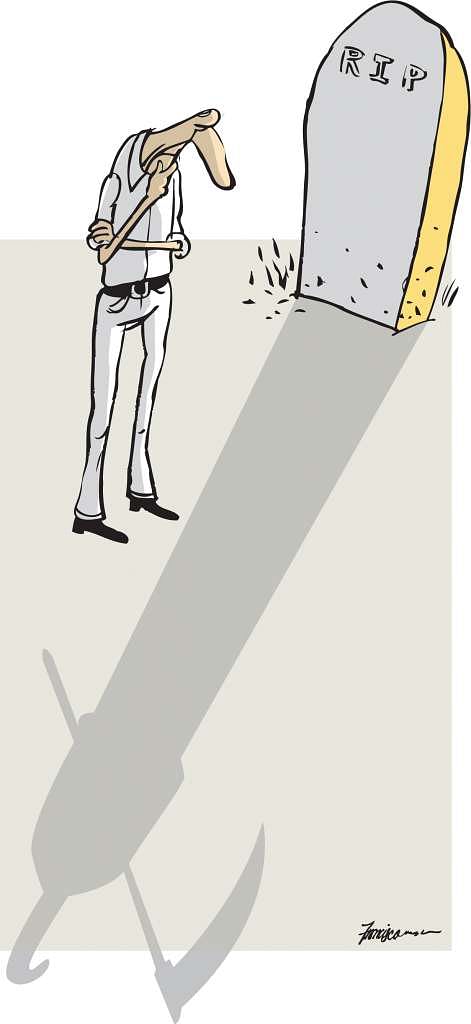The older we get, the closer we get to death. No, that is not quite right.
What I meant to say is, the older we get, the closer death gets to us.
Personally, I don't expect to expire just yet. Statistically speaking, I can expect to live for another 20 years or more. But I have reached the stage where my parents' generation is dying off in great numbers. It seems that every time I telephone home to England, to speak to my dad, or to my Auntie Olga, or to my wife's parents, I hear about another funeral. Their former school friends and work- mates are dying at an alarming rate.
And the thought intrudes itself upon me that they, themselves, will not be around forever.
Death may not yet be knocking at my door, but he is beginning to cast a shadow over my life.

When most people die, you say, "What a pity." Then, soon afterwards, you get to thinking, "What's for dinner?"
But there are other people who, when they die, will leave your world a colder, sadder place. They will leave a hole in your soul nothing else and nobody else will ever fill.
When I think about those people and about the time, perhaps not so very far away, when I will lose them, I feel a sensation of panic.
Following the death of his wife, Joy Davidman, the English novelist, academic and theologian C.S. Lewis writes: "No one ever told me that grief felt so like fear.
"I am not afraid, but the sensation is like being afraid. The same fluttering in the stomach, the same restlessness, the yawning. I keep on swallowing."
This is very much the way I feel, right now, at the mere thought of losing the people dearest to me.
A GRIEF ANTICIPATED
All of this has led me to wonder if there is anything I can do to prepare for the inevitable sadness and loss that lie ahead.
My first thought was to try to gain an understanding of grief by reading about it.
So I turned to the pages of Lewis' A Grief Observed, in which he charts the course of his own post-bereavement pain and sorrow.
It did not offer me much comfort.
Grief, if Lewis' experience is anything to go by, seems to be a very personal thing which must be faced and endured when the time comes.
He writes: "Aren't all these notes the senseless writhings of a man who won't accept the fact that there is nothing we can do with suffering except to suffer it?
"Who still thinks there is some device (if only he could find it) which will make pain not to be pain."
Death is a part of life and for all of us who are lucky enough to live out the full term of our lives, there will be a time for grief, and sorrow, and loss.
TIMELY ADVICE
On a recent visit home to England, I spent a day walking in the beautiful Lake District with an old school friend.
We got to talking about all of this and he said something that struck me as very astute.
"The one thing you can usefully do to prepare for bereavement," he says, "is to minimise regret. Show them and tell them now - before it's too late - that you love them."
Timely advice, I think.
•Gary Hayden is a philosophy and science writer. His new book, Walking With Plato, is out at major bookshops here.
